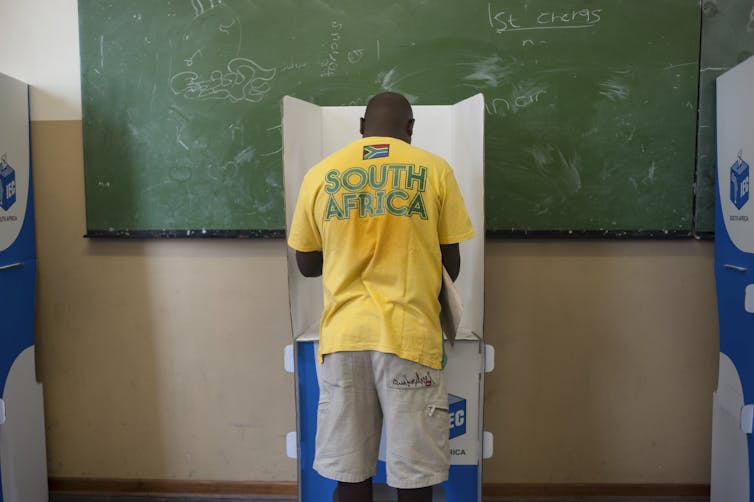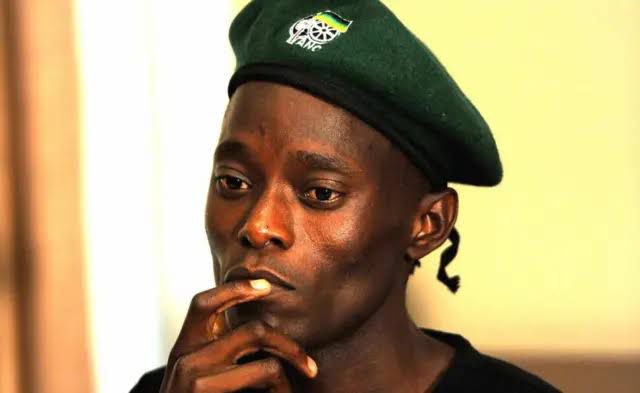South Africa gets help tracking down social media predators ahead of poll
By: Martin Plaut, School of Advanced Study

EPA/Ihsaan Haffejee
Can South Africa really hold a general election on the 8th of May in a way that it really represents the views of its people? One might have thought this was an academic question. The Electoral Commission of South Africa is well respected and the legal system is robust. There are certainly enough political parties – around 285 are registered even if most are unlikely to participate in the May elections – for the national and nine provincial legislatures.
But there have been worrying signs about the use of disinformation during previous elections and these need to be heeded.
Google is deploying some of its vast resources to train political parties, journalists and editors how to spot and fight fake news. This is part of a $300 million international initiative it announced in March last year that has three objectives. To “highlight accurate journalism while fighting misinformation, particularly during breaking news events, to “help news sites continue to grow from a business perspective”, and finally to “create new tools to help journalists do their jobs.”
Mich Atagana, communications manager of Google South Africa, says their work will involve protection against attacks on websites of political parties, but will also find ways of preventing the spread of disinformation. The company works through a system of “flaggers”, she explained, who are trained to spot misinformation. If they do, they can contact Google which then takes action.
We can easily de-monetise the website and take away the ranking. We can make sure it does not show up on Google search
Google will have up to nine staff working on their programme in the run-up to the election. They will be working with sites like Africa Check to allow the public to assess which news is true and which is not.
These initiatives are far from a perfect solution. But they are a start, and they are badly needed.
Disinformation
During the 2016 local elections the country’s governing party, the African National Congress (ANC), ran a “black ops room” to push out disinformation. The party spent R50 million (£2.75 million) on the operation. Its work included putting out fake posters, purportedly from opposition parties, news sheets delivered door-to-door and planted callers on radio phone-ins.
The party also controlled the state broadcaster – the SABC – through its political appointees. This is critical during elections. No other media organisation comes close to reaching the millions of voters in rural areas – particularly in vernacular languages.
More covert tactics have been used in the past. A carefully orchestrated disinformation campaign was ruthlessly deployed by the British PR company, Bell Pottinger against anyone who stood in the way of former President Jacob Zuma. Working for his Indian backers, the Gupta brothers, they popularised the term “white monopoly capital”, to attack his opponents.
The agency was largely the brainchild of Tim Bell, who earned his reputation helping Margaret Thatcher win three elections. It was only after the internal workings of the agency were exposed in the South African media that the firm was finally driven out of business and forced into administration.
The tip of an iceberg
Google will train about 100 journalists by the time of the election.
South African freelance journalist Carien du Plessis said when I interviewed her recently that even if websites are brought under control it will not be halt the problem.
Three South African editors launched a defamation claim against AIG Europe, the insurer for now defunct Bell Pottinger. Richard Meeran, the lawyer representing the editors, made this comment:
This case highlights the increasingly worrying menace of social media backed by sophisticated technology being used to manipulate public opinion with fake information.
South Africa is by no means the only African country suffering from cyber-attacks. Russian and Ukrainian firms are said to have targeted several governments and private companies, in search of lucrative contracts.
The Zimbabwean government is reported to have used private data to target citizens with Tweets and text messages. And five operators have been identified using Spyware to try to influence the public from Morocco to Mozambique.
If Africa’s fragile democracies are to survive they will need all the help they can get to resist aggressive predators on the internet and social media.![]()
Martin Plaut, Senior Research Fellow, Horn of Africa and Southern Africa, Institute of Commonwealth Studies, School of Advanced Study
This article is republished from The Conversation under a Creative Commons license. Read the original article.
Written by: Natasha
Similar posts
MORE ARTICLES

ANC Youth League demands justice for Sindiso Magaqa beyond hitman’s conviction

Liverpool FC vows to pay out Diogo Jota’s R350 million contract to his widow

The World Show with Nicky B broadcasts live from France

Sindiso Magaqa assassin handed an 85-year sentence

Skhumba, Kgomotso and Glen weigh in on reincarnation
QUICK LINKS
UpComing Shows

The Best T in the City
With T Bose
He has held it down in the world of mid-morning radio with the best music, riveting topics, brilliant mixes and interesting guests. Every weekday, The Best T proves why he is the BEST by connecting to you like only your bro or favourite uncle could. He lets his listeners dictate the songs they want to hear in the ever-popular Top 10 at 10, and his Three Teaspoons never run out. Catch The Best T in the City Mondays to Fridays from 09h00 to 12h00.
close
Feel Good
With Andy Maqondwana
Feel good about feeling good! That's exactly what The Feel-Good show is about. An escape from the negativity that surrounds us, indulging you in good feels. Pass it on to one and all. Spread the good feeling around Gauteng with Andy Maqondwana.
close
Kaya Biz
With Gugulethu Mfuphi
The world of business is simplified for you by Kaya Biz with Gugulethu Mfuphi. This fast-paced award-winning business show talks to the corporate giants as well as up and coming entrepreneurs about their wins and challenges. Gugulethu invites guests to offer their analyses of markets and economies, and also delves into issues of personal financial wellness. Kaya Biz airs Mondays to Thursdays 18h00 to 19h00.
close
Point of View
With Phemelo Motene
Point of View with Phemelo Motene delves into the day’s current affairs, touches on real issues that affect people’s daily lives and shares expert advice on questions posed by the audience. Mondays to Thursdays 20:00 to 22:00.
closeConnect with Kaya 959
DownLoad Our Mobile App
© 2025 Kaya 959 | On The Street On The Air











